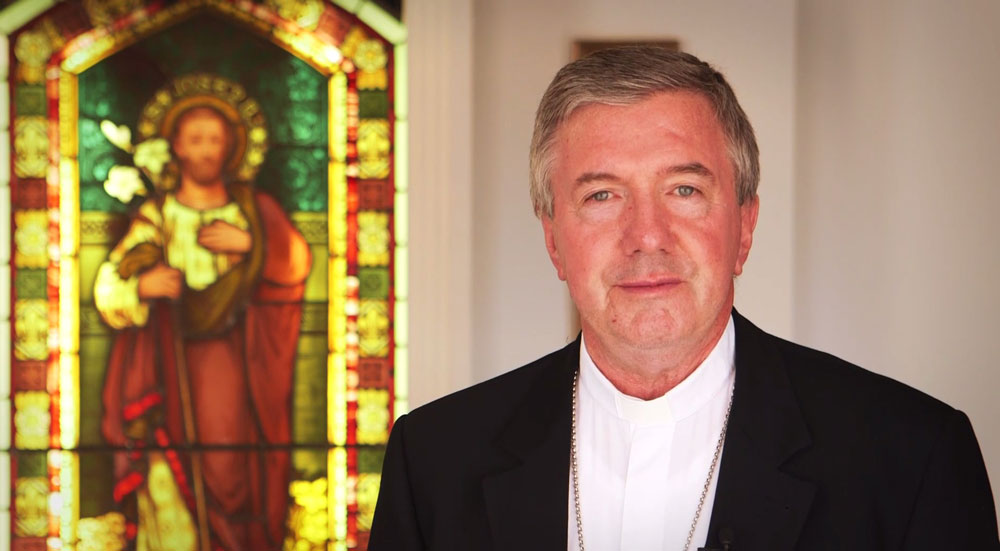
Archbishop Christopher Prowse has claimed the Catholic community is angry about the Calvary Hospital plans. Photo: File.
”The Catholic community is angry!”
It’s an attention-grabbing statement, especially when made by senior clerics Archbishop Christopher Prowse and his former Vicar General, Fr Tony Percy, regarding the Calvary Hospital takeover. But such statements bear analysis these days.
The Catholic community today is much smaller than it once was and is dwindling year on year. The two senior clerics know this, as does anyone who attends Mass regularly (as I do). The decline in numbers is just one aspect and the demographic reality means the trend will grow exponentially.
But perhaps more significantly, Catholics are much less inclined to be stirred up by their clerical leaders. When it comes to the crunch, Catholics are guided by their own consciences and make up their own minds – and those minds are typically Australian.
The plebiscite on same-sex marriage revealed no significant difference in the voting patterns of Catholics to those of other residents in their streets. Polls in Canberra suggest it would not be much different on the issue of euthanasia.
The reality is there is a growing disconnect between ordinary Catholics and their episcopal leaders.
None of this should surprise the bishops, as it was clearly spelled out in the submissions from lay Catholics to the recent Catholic Plenary Council process. They conveniently ignored it then and continue to do so. But ultimately, there is a price to be paid for this lack of trust and confidence.
The greatest factor in this equation is the poor leadership displayed by the bishops at the height of the sexual abuse scandal. Defending an institution rather than victims hardly wins respect. Cover-ups never help.
But over and above that, Catholics are far from impressed by a leadership group that takes refuge in inertia, is slippery to deal with and raises hopes for change and improvement, but then finds copious reasons for doing little. Hypocrisy is ultimately the killer factor.
And so, we come to the current Calvary Hospital dispute. The Archbishop has particular difficulties in this regard – all of his own making. In his nine years in the role, he has steadfastly refused to implement proper governance structures.
Most recently he’s failed to implement recommendations from a Governance Committee he established in 2021, to publish an archdiocesan annual report and financial statement. It seems opaque trumps clear.
In 2022, he set up a working party to advise on establishing a diocesan pastoral council. Only in the past few months have we learned that he has rejected sound legal and governance advice from this group of eminent Catholics with impeccable legal and pastoral qualifications.
They were fobbed off on the basis that further investigations are required. This rejection is seen by many as the last straw. It is hard to help people who seemingly don’t want to be helped.
The Archbishop’s two immediate predecessors worked constructively within a diocesan pastoral council structure. Indeed, Canberra Goulburn, under the leadership of former Archbishop Carroll, became a pathfinder for lay involvement and pastoral assemblies.
Archbishop Prowse, however, will have none of it. It’s reached the point where his reasons for not implementing appropriate governance accountability and transparency are seen as disingenuous.
So, when Archbishop Prowse goes public complaining of the lack of transparency and accountability of the ACT Government, he has no clothes. He may have a case, but he is the last person who could credibly prosecute that case.
The royal commission into sexual abuse in institutional settings endorsed diocesan pastoral councils as a form of open and accountable governance and recommended that Australia’s Catholic bishops seriously evaluate their wider implementation.
The working party was then established by the bishops following these governance recommendations.
Despite all this, Archbishop Prowse continues to push back – to find implausible excuses for not implementing recommendations, despite a clear lack of accountability in the reporting on entities of the archdiocese. Currently, some structural accountability falls short of the reporting requirements of the Australian Not for Profit and Charities Commission.
One doesn’t have to look far to find technical and other discrepancies in the reporting and accountability trails of archdiocesan entities. If a Commonwealth Government wanted to be thorough, it could likely find reasons for excluding Catholic agencies from several sources of public funding.
If that were to happen, however, it’s likely that the local Catholic authorities would resort to their faux victimhood claims. Yet, just like the sexual abuse scandal itself, it’s the organisation that is failing. I would rather not have to tell this tale. But the truth needs to be stated. Sadly, we come back to hypocrisy. Beware an archbishop crying wolf.
Terry Fewtrell is a 76-year-old, lifelong Catholic, who is active in church reform movements, including Concerned Catholics of Canberra Goulburn. His views are his own.












